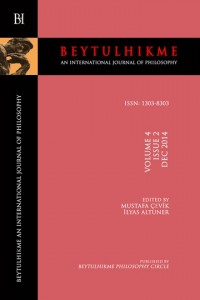Öz
Sartre, as in all the existential philosophers, argues that the existence of the people precedes essence and essence is determined within the existence. According to Sartre, the essence of human existence is not predetermined. Sartre defends that, correlating the matter of existence and essence with free will, free choices made by human within his possibilities constitues his essence. Because, according to Sartre, man himself decides what needs to be. He is the only creatures who first exists and then creates himself, he is like he created himself. Sartre is an existential atheist. For this reason, his understanding of being and existence is related to his atheism. A human having an absolute freedom in the absence of God is in despair and pessimism. For Sartre, absolute freedom which is the main feature of the existence, makes an individual the reason for everything. Man condemned to freedom creates an essence for himself with his own choice. Crushed under the heavy responsibility that has brought, individual faces feeling of nausea since his existence. In this article, it has been attempted to present his thoughts on existentialism with reference to J. P. Sartre's basic concepts.
Kaynakça
- Akarsu, B. (1998). Çağdaş Felsefe. İstanbul: İnkılap Kitabevi.
- MacIntyre, A. (2001). Varoluşçuluk (ev. H. Hünler). İstanbul: Paradigma Yayınları.
- Aydın, M. (2002). Din Felsefesi. İzmir: İzmir İlahiyat Fakültesi Vakfı Yayınları.
- Bochenski, İ. M. (1983). Çağdaş Avrupa Felsefesi (çev. S. R. Kırkoğlu). İstanbul: Yazko Yayınları.
- Chiristian, L. J. (1986). Philosophy an Introduction of Wondering. New York: College Publishing.
- Copleston, F. (1996). Felsefe Tarihi: Nihilizm ve Materyalizm (çev. D. Canefe). İstanbul: İdea Yayınevi.
- Foulquie, P. (1967). Varoluş Felsefesi (çev. N. Topçu). İstanbul: Hareket Yayınları.
- Gürsoy, K. (1987). Jean Paul Sartre Ateizminin Doğurduğu Problemler. Ankara: Akçağ Yayınları.
- Foulquie, P. (1991). Varoluşçuluk (çev. Y. Sahan). İstanbul: İletişim Yayınları.
- Magill, F. (1992). Egzistansiyalist Felsefenin Beş Klasiği (çev. V. Mutal). İstanbul: Dergâh Yayınları.
- Peltek, O. (1954). Existansiyalizm Üzerine. İstanbul: Kültür Dünyası.
- Ritter J. (1954). Varoluş Felsefesi Üzerine (çev. H. Batuhan). İstanbul: İstanbul Üniversitesi Edebiyat Fakültesi Yayınları.
- Sartre, J. P. (1999). Bulantı (çev. E. Aklan). İstanbul: Roman Yayınları.
- Sartre, J. P. (2005). Varoluşçuluk (çev. A. Bezirci). İstanbul: Say Yayınları.
- Sartre, J. P. (1989). Being and Nothingness: An Essay on Phenomenological Ontology (trans. H. E. Barnes). New York: Philosophical Library.
- Sartre, J. P. (2001). Özgürlüğün Yolları: Akıl Çağı (çev. Gülseren Devrim). İstanbul: Can Yayınları.
- Topçu, N. (1999). Varoluş Felsefesi. İstanbul: Dergâh Yayınları.
Ayrıntılar
| Birincil Dil | Türkçe |
|---|---|
| Bölüm | Makaleler |
| Yazarlar | |
| Yayımlanma Tarihi | 30 Aralık 2014 |
| Yayımlandığı Sayı | Yıl 2014 Cilt: 4 Sayı: 2 |

